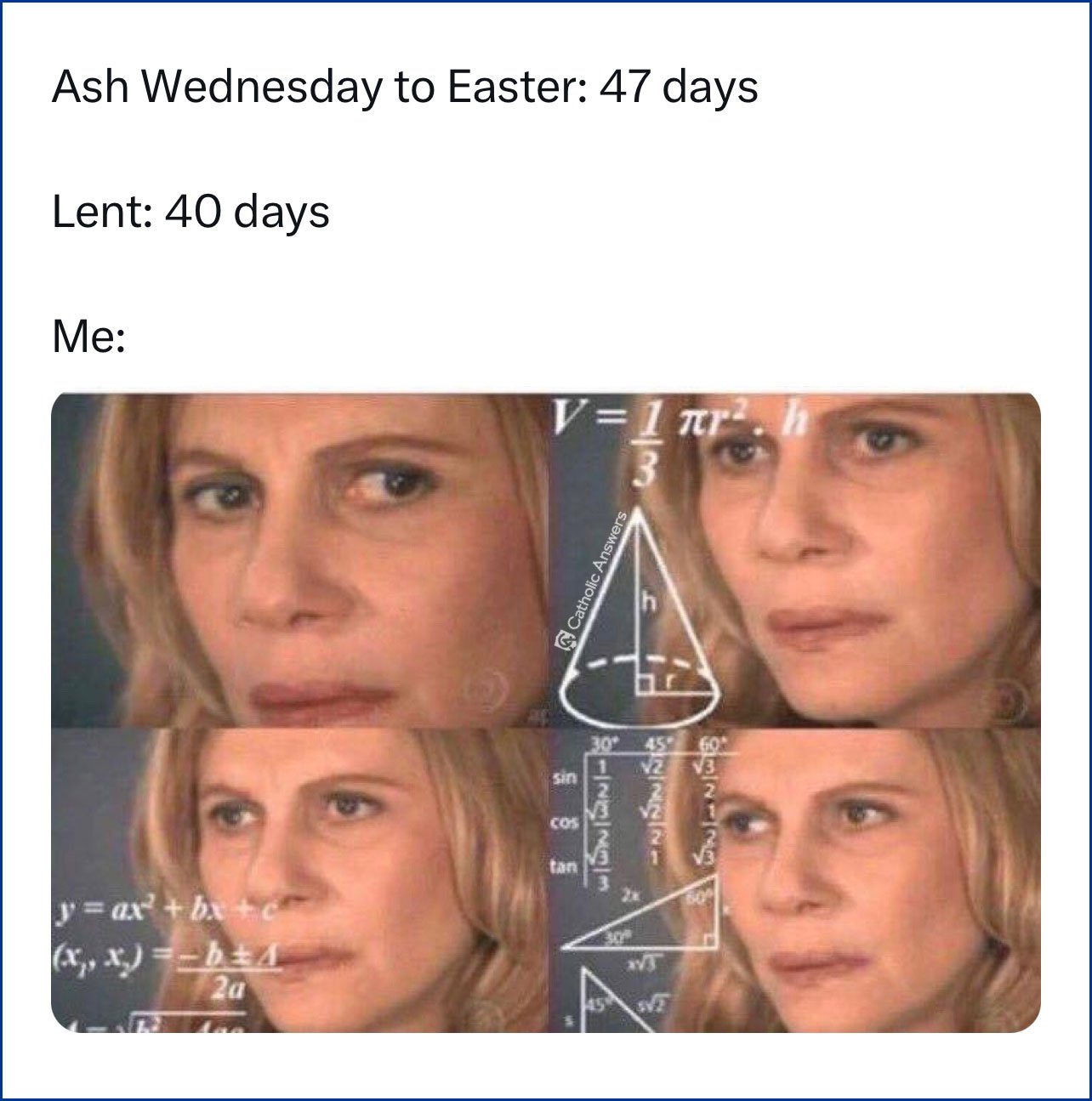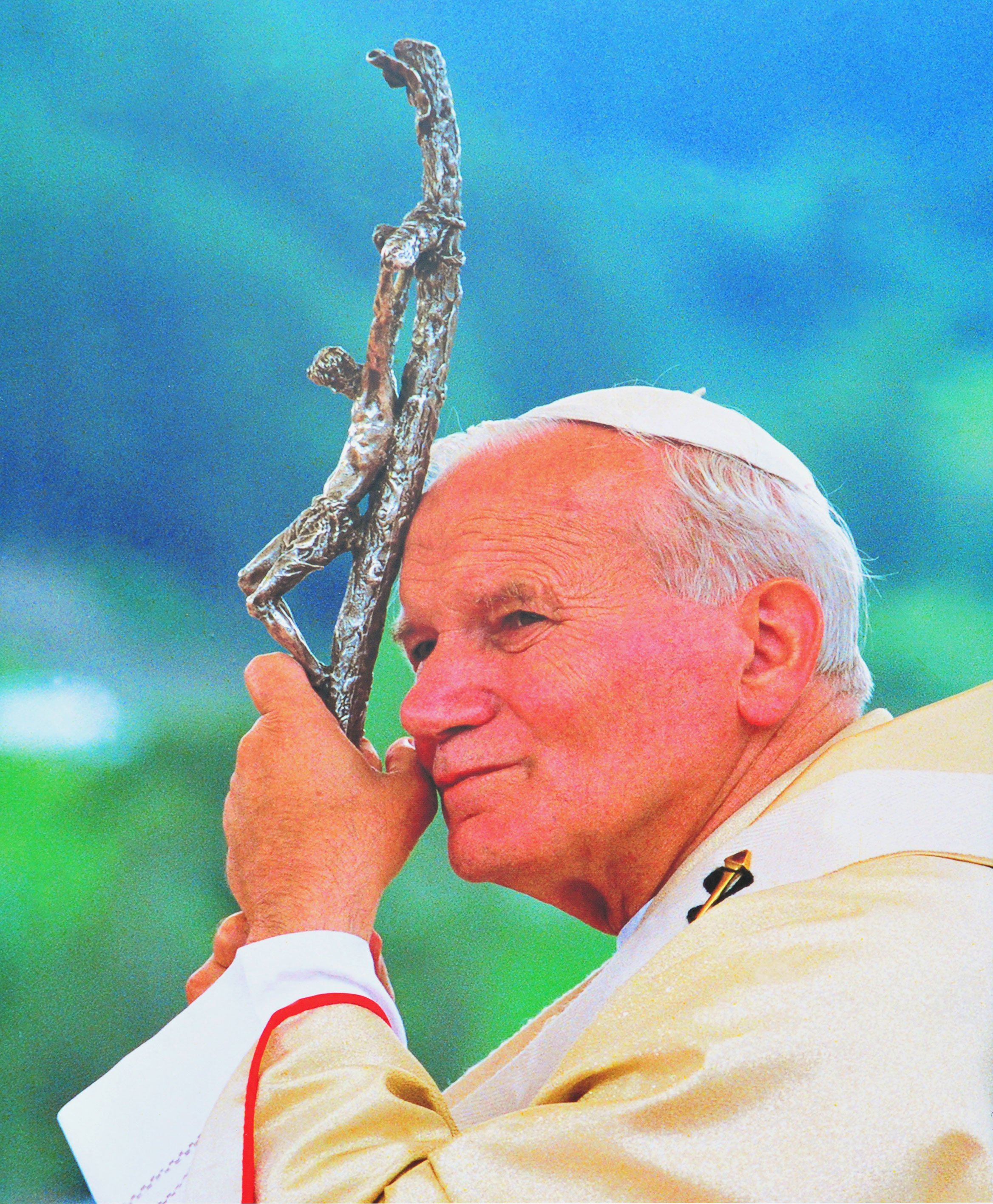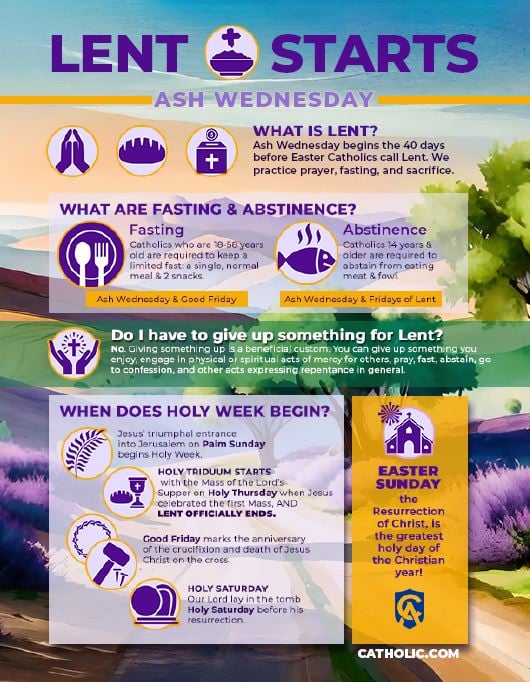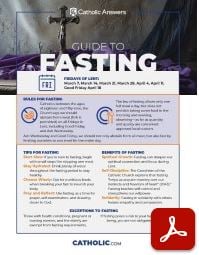
What Is Ash Wednesday? What Is Lent?
Ash Wednesday 2025 begins the Lenten season. Lent is the time before Easter when Catholics prepare to commemorate Jesus’s Resurrection through prayer, penance, and fasting. Get our free 20 Answers Lenten Series and make this your best Lent ever!
Mark Your Calendar: When Is Ash Wednesday in 2025?
Ash Wednesday falls on March 5, 2025, marking the beginning of the Lenten season.
During Lent, there are many special days and phrases. These include Mardi Gras, Shrove Tuesday, Maundy Thursday, Holy Week, Palm Sunday, Passion Sunday, dust to dust, and more. If you’re looking for answers about public penance, ashes on the forehead, or Jesus Christ, Catholic Answers has you covered.
Lent is approximately forty days long. If you count the days from Ash Wednesday to Holy Thursday’s Mass of the Lord’s Supper, you’ll find more than forty days. That’s why it’s not exactly forty days.

Ash Wednesday
Sundays are a part of this period. Some people don’t give up things on Sundays during Lent, and that’s okay because our sacrifices are voluntary. But fasting on Ash Wednesday and not eating meat on Fridays during Lent are mandatory, unless you’re too young or old.
Can You Eat Meat on Ash Wednesday?
Thousands search Catholic.com every year for things like Lent rules, Lent fasting, Catholic fasting rules, and Catholic Lent rules. So here are the Ash Wednesday fasting rules for Lent.
Abstinence and fasting are to be observed on Ash Wednesday and Good Friday. The Code of Canon Law says:
Can. 1251: Abstinence from eating meat or some other food according to the prescripts of the conference of bishops is to be observed on all Fridays, unless a solemnity should fall on a Friday. Abstinence and fasting are to be observed on Ash Wednesday and Good Friday.
Can. 1253: The conference of bishops can determine more precisely the observance of fast and abstinence as well as substitute other forms of penance, especially works of charity and exercises of piety, in whole or in part, for abstinence and fast.
Fasting Guidelines on Ash Wednesday
We know that fasting and abstinence are observed on Ash Wednesday. Use these simple tips to guide you. From the age of eighteen until their fifty-ninth birthday, Catholics are required to fast on this day.
This involves eating one full meal and two smaller meals. The total amount of food consumed in the two smaller meals should not be equal to a full meal. Additionally, all Catholics over the age of fourteen are expected to abstain from meat on this day.
In Pope Benedict XVI’s homily on Ash Wednesday 2006 he said:
Lent reminds us, therefore, that Christian life is a never-ending combat in which the “weapons” of prayer, fasting and penance are used. Fighting against evil, against every form of selfishness and hate, and dying to oneself to live in God is the ascetic journey that every disciple of Jesus is called to make with humility and patience, with generosity and perseverance.
Ash Wednesday Services Near Me
Want to make it to services this Ash Wednesday and receive ashes? Use Catholic Answers built-in “find a church near me” by putting in your zip code, city, or address. This is a great way to start your Lenten journey.
Prayers for Ash Wednesday
There are a few prayers traditionally associated with Ash Wednesday in the Catholic Church.
Ash Wednesday Collect
The USCCB provides the opening prayer of the Ash Wednesday liturgy known as the “collect.”
Grant, O Lord, that we may begin with holy fasting this campaign of Christian service, so that, as we take up battle against spiritual evils, we may be armed with weapons of self-restraint. Through our Lord Jesus Christ, your Son, who lives and reigns with you in the unity of the Holy Spirit, God, for ever and ever. Amen.
Blessing of the Ashes
This prayer is said by the priest when blessing the ashes that will be distributed:
O God, who are moved by acts of humility and respond with forgiveness to works of penance, lend your merciful ear to our prayers and in your kindness pour out the grace of your blessing on your servants who are marked with these ashes, that, as they follow the Lenten observances, they may be worthy to come with minds made pure to celebrate the Paschal Mystery of your Son. Through Christ our Lord. Amen.
Prayer While Receiving Ashes on Ash Wednesday
The priest, deacon, or lay minister, says one of these formulas as ashes are imposed on the faithful:
Repent, and believe in the Gospel.
Remember that you are dust, and to dust you shall return.
-Ash Wednesday Prayer for Forgiveness and Conversion
Although not specific to Ash Wednesday, making an Act of Contrition is an ideal prayer for the spirit of the day.
O my God, I am heartily sorry for having offended Thee, and I detest all my sins because of thy just punishments, but most of all because they offend Thee, my God, who art all good and deserving of all my love. I firmly resolve with the help of Thy grace to sin no more and to avoid the near occasion of sin. Amen.
Consider praying a daily Rosary if you’re not already in the practice of doing so.
Catholic Answers Quick Guide for Ash Wednesday and Lent
Download our free PDF, which takes you from Ash Wednesday until Lent ends with the beginning of the Mass of the Lord’s Supper on Holy Thursday evening.
When Does Lent Really End?
One of the top questions we get during the Lenten season is “When does Lent really end?” So, we put together this quick Q & A.

Pope St. John Paul II
“Lent is a season of intense prayer, fasting, and concern for those in need. It offers all Christians an opportunity to prepare for Easter by serious discernment about their lives, with particular attention to the word of God which enlightens the daily journey of all who believe.”
– Pope St. John Paul II
In the season of Lent, let us embrace the call to penance, prayer, and almsgiving. Through self-discipline and reflection, may we draw closer to the transformative love of Christ, preparing our hearts for the joy of Easter.
History of Lent
Significance of Ash Wednesday
Ash Wednesday service is not mandatory in the Catholic Church, so going to Mass is a personal choice. However, many Catholics observe this day by attending Mass and receiving ashes on their forehead. The priest may say the words, “Remember that you are dust, and to dust you shall return,” emphasizing the virtues of penance and humility.
What’s the Deal with Ashes on Ash Wednesday?
On Ash Wednesday, wearing ashes on your forehead can feel like a bold proclamation of Faith, drawing curious or puzzled glances from others. Remember, this visible sign of repentance and humility is an opportunity to witness to Christ with quiet confidence and a joyful heart. Watch this short video to learn ways to respond.
Purpose of Lenten Season
Lent is a time of spiritual preparation, self-examination, and penance leading up to the celebration of Easter. Catholics use this time to imitate Jesus’ forty days of fasting in the desert.
It is an opportunity for us to deepen our relationship with God, seek forgiveness for sins, and grow in spiritual discipline. Catholics focus on self-denial, prayerful reflection, and charitable acts as a means of drawing closer to God.
Penance and Fasting During Lent: Do I have to Give Something Up for Lent?
Download Our Guide to Fasting
Guide to Holy Week
Want to prepare for the holiest week of the year? Visit the Catholic Answers Guide to Holy Week.
Additional Resources
Mardi Gras – Everything you need to know about Fat Tuesday.
Last-Minute Lenten Penance Guide – So, Lent is here and you’re way behind. No need to worry! Try our last-minute Lenten penance guide.
20 Answers: Seasons and Feasts
This booklet demystifies the “Church calendar,” explaining the beautiful way in which our prayers and observances are ordered throughout the liturgical year. It also clears up common misconceptions about certain Catholic practices and offers tips on participating in the Church’s seasons and feasts more fruitfully.
The Imitation of Christ by Thomas à Kempis
This classic is the second most read spiritual book after the Bible, and for centuries has had an astonishing impact on the lives of countless saints, peasants, and popes.
The Confessions by St. Augustine
People consider The Confessions one of the greatest Christian classics of all time.





